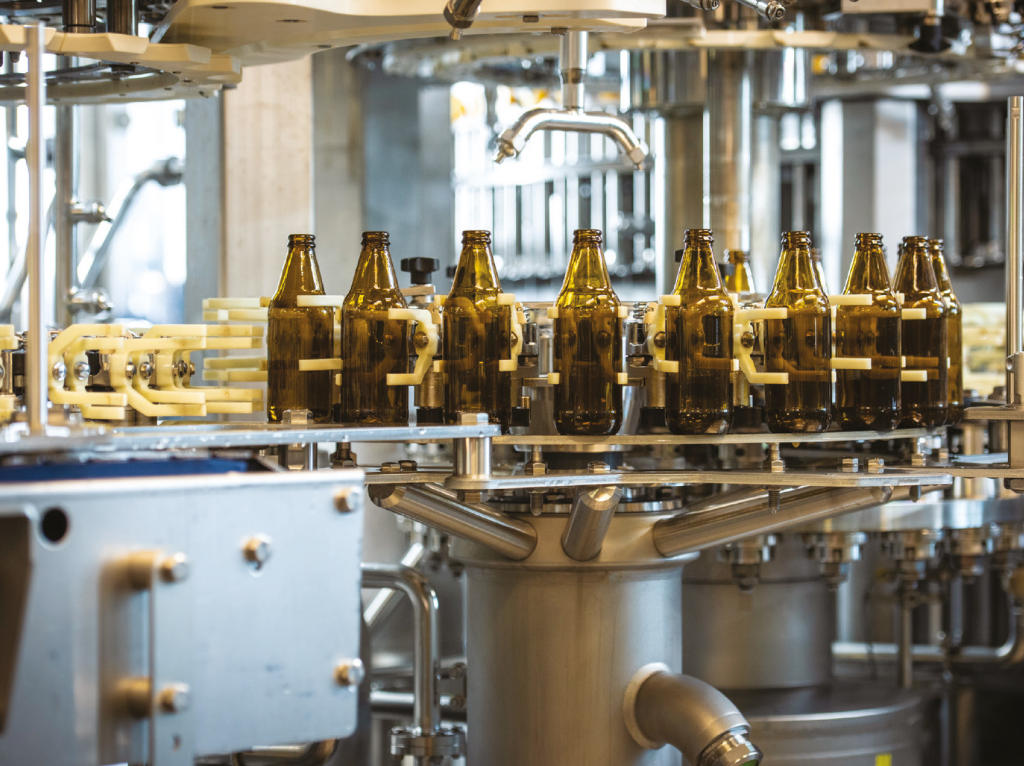Vetropack’s robust, lightweight returnable glass bottle is creating a sensation in the Austrian state of Vorarlberg. Enjoying a wide variety of innovative beers is very much part of life in this corner of the country, where the offerings are somewhat stronger than in the nearby Allgäu region and include seasonal and creative beers that offer special taste experiences. The Mohrenbrauerei – a brewery founded by Johann Mohr at Dornbirn back in 1763 – is to thank for this. The brewery passed into the ownership of the Huber family in the 19th century and still maintains close ties with the local people and the region. A market share of 53% sends out a clear message, and many Vorarlberg expats remain loyal to their favourite beer long after leaving the region.
Mohrenbrauerei first used Vetropack’s exceptionally sustainable 0.33l lightweight glass bottle for its Mohrenbräu Pfiff beer. Offering a reduced carbon footprint of up to 25%, the bottle is now also being used for the brewery’s Mohrenbräu Spezial beer.
Combining tradition with innovation
Andreas Linder, Mohrenbrauerei’s Head of Marketing, reports: “We view ourselves as a brewery that is innovative and sustainable. Of course, we also do our job with professionalism and passion, and we take a holistic approach to the subject of beer. That includes the dialogue we maintain with customers and the catering trade, our diverse range of products, and also aspects such as service and product expertise, regular maintenance and modernisation of the production plant and dispensing equipment – the list could go on.” Visitors to Mohrenbrauerei can discover a world packed with experiences, attend a seminar on brewing or train as a beer sommelier, and sample international beers of all styles that are almost impossible to find elsewhere.
The last two years have seen the addition of a lager and a wheat beer to the brewery’s range, which also includes trending varieties such as Pale Ale and Radler Grapefruit, as well as a series of local specialities. Alongside these beverages, Mohrenbrauerei offers about six creative beers each season: these are brewed on a small scale (around 200 to 600 bottles), becoming highly sought-after collectors’ items. For the 2022 summer season, for example, Mohrenbrauerei created a new Mojito beer.
Repackaging a best-seller
With a market share of over 30%, the brewery’s distinctive high-strength Mohrenbräu Spezial is its most popular product. Since 2022, this beer has also been available in the 0.33l lightweight glass bottle by Vetropack. A special process is used to manufacture this returnable bottle, which weighs a mere 210g (instead of 300g). Thermally tempered glass reduces wear on the contact surfaces (scuffing).
Mohrenbrauerei began using Vetropack’s lightweight glass bottles over three years ago for its Pfiff ‘March Beer’ and Radler varieties: this cuts logistics costs because the volume that needs to be moved from A to B is reduced by 1,000 tonnes per year. “And for Mohrenbräu Spezial, the savings will turn out to be many times greater,” Mr Linder is delighted to point out. “This fits excellently with our image as an innovative and sustainable brewery that values and promotes social solidarity – to take another example, we also meet our entire energy requirement with green power.” Overall CO2 emissions per (lightweight) bottle are slashed by a quarter compared to a normal 0.33l returnable bottle.
Sustainability trailblazer
Another reason for switching to Vetropack’s 0.33l lightweight glass bottle is that the height of the crates containing these bottles is lower, so they can be stacked six-high on a pallet, instead of five-high as before.
All in all, this is a major step on the path towards greater sustainability – and the history of this journey goes back a long way: the first discussions between Vetropack and Mohrenbrauerei took place in 1998. “Back then, Mohrenbrauerei was the only brewery in Austria that was willing to commit to the lightweight glass experiment,” explained Mr Linder. “That really put us ahead of our time, because a packaging change of this sort shouldn’t be underestimated. It includes detailed product tests – how does the bottle feel, how does the beer behave in it, what does the label look like, and so on. Then the process has to be co-ordinated with everyone involved and, finally, there is the technical conversion of the bottling plants. But at the end of the day, it’s the market or the end customers who decide whether the product will be a success. In that regard, it’s no exaggeration to say that we encountered some scepticism at the start. And for a long time, the sustainability issue didn’t have the priority that it enjoys today. Fortunately, things have changed: nowadays, it’s important for many customers – and some of them are even specifically looking for sustainability.”
So Vetropack’s 0.33l returnable bottle for Mohrenbräu Spezial comes at exactly the right time, offering a way to improve the brewery’s climate footprint and make production more sustainable. But that’s not all: at a time when overall beer consumption is declining throughout the world, it also gives Mohrenbrauerei access to new target groups – for example, people who pay particular attention to the environment and those who have little carrying capacity or prefer smaller quantities.
0.5-litre bottles as well?
Andreas Linder sums up: “Of course, we pioneered the lightweight glass bottle from Vetropack, and we shall miss that unique status as the new packaging becomes more widespread in the market. But its advantages are clear to see, and the potential is simply gigantic. So we’re proud that we played our part in this – and, who knows? It might soon be time to extend this approach to include the 0.5l bottles. Although nothing specific is planned as yet, in principle I see no reason why the success story shouldn’t continue in this direction.”


